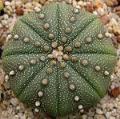
DMT-Nexus member
Posts: 154 Joined: 03-May-2010 Last visit: 18-Dec-2013 Location: Under the sea
|
A couple of days ago I had the idea of culturing cacti in-vitro; not sure why or even how, so I started doing some research. I found that it's a common practice known as plant tissue culturing, in particular we are talking about cacti. I will try to attach some relevant documents that I found. Enjoying experiments, I decided to do some simple (and probably improvised) experimentation. I prepared 9 different 50ml glass erlenmeyers, each one with different concentrations of sucrose (30g/l or 0g/l), NAA, and plant fertilizer in 50ml of distilled water. Then I boiled the containers in an attempt of sterilization. I chopped cacti tissue and put them in a 1% bleach solution for 1 hour. Then I placed approximately 1g of chopped cacti in each one of the containers. I was as clean as I could, using sterilized tools and cleaning everything before its use, but this may not even be enough. I'll try to build a glove box. The containers were then placed in a growing chamber with a 16h photoperiod at approximately 25°C. My future attempts will be much more planned and I'll try to follow standardized tissue culture protocols. This was just a first approach, however there may be something interesting to get from it. The objective of this is to reproduce a lot of cacti very fast. With laborious experimentation I think that it may even be possible to grow cacti cells completely in-vitro without them getting specialized to form a new specimen. This way it could be possible to create something similar to a bioreactor. But I'm just guessing here. So is anybody interested in this project? Does anybody have any experience or would like to try something with this? I think that the possibilities are enormous. This is a potential way of incredibly increasing the growth rate of specimens with interesting properties! Edit: a pic is always nice  Some resources: http://en.wikipedia.org/wiki/Plant_tissue_culturehttp://en.wikipedia.org/...rashige_and_Skoog_mediumI also found this in another forum: http://www.shroomery.org...wflat.php/Number/1932583The text above was typed by frenzy monkeys randomly hitting their keyboards.
|
|
|
|
|

DMT-Nexus member
Posts: 6 Joined: 11-Jul-2010 Last visit: 21-Jun-2012 Location: England
|
I'll be watching this thread with much interest dude, great idea.
I read that when you graft lophs onto a faster growing stock cactus, the loph grows at a faster rate but the rate of mescaline production doesn't match growth rate. It might be something to take into account for this too.
Is the cactus tissue some type of Trichocereus?
|
|
|

DMT-Nexus member
Posts: 154 Joined: 03-May-2010 Last visit: 18-Dec-2013 Location: Under the sea
|
Yes, I don't know how the mechanisms of the plant respond in this growing conditions. We are aware that injecting the cacti with dopamine to increase the mescaline production is completely false and unfounded scientifically; however I was thinking that in this case it may be different. It may be possible to increase the availability of key precursors directly in the growing solution. But again, I'm just guessing here. And yes, it's a T. cuzcoensis. If this first experiment is at least a little bit successful (read "it doesn't rot"\), I'll try it again with pachanoi. The text above was typed by frenzy monkeys randomly hitting their keyboards.
|
|
|

DMT-Nexus member
Posts: 788 Joined: 09-May-2010 Last visit: 07-Dec-2019
|
this is an awesome idea adivino, and very ingenious. my experience is very limited so can't help you there, but i'm so excited for you! gonna watch this thread closely as it progress. if it works, then holy shit dude. But even if it doesn't its still a frickin awesome idea..thinking outside the box is what we need..and you've got that! best of wishes on your project, and hope this works  p.s. flask #3 is the coolest looking <3
|
|
|

DMT-Nexus member
Posts: 937 Joined: 23-Oct-2009 Last visit: 25-Mar-2012 Location: Netherlands
|
yea nice idea  what key precursors could be used to boost mescaline production? are they available and would they be stable in the solution? and how about growing the material on a surface? “The most important thing in illness is never to lose heart.” -Nikolai Lenin
I know that you believe you understand what you think I said, but I'm not sure you realize that what you heard is not what I meant.
|
|
|

DMT-Nexus member
Posts: 154 Joined: 03-May-2010 Last visit: 18-Dec-2013 Location: Under the sea
|
This paper should be very relevant: A Revised Medium for Rapid Growth and Bio Assays with Tobacco Tissue Cultures, Murashige & Skoog (1962). It can be found here http://www3.interscience...urnal/119762126/abstract . If somebody has access to it, I'd really like to read it. The text above was typed by frenzy monkeys randomly hitting their keyboards.
|
|
|

DMT-Nexus member
Posts: 788 Joined: 09-May-2010 Last visit: 07-Dec-2019
|
Hey Adivino, whats the progress with this project of yours? Are you still working on it? Would love to hear about its outcomes, regardless of whether it was a fail or success. Best of luck  <3
|
|
|

DMT-Nexus member
Posts: 154 Joined: 03-May-2010 Last visit: 18-Dec-2013 Location: Under the sea
|
Phantastica, the experiment failed. The required sterile conditions were not met and fungi rapidly took over the growing medium. Furthermore, the growing medium wasn't appropriate since it lacked several of the crucial components, so nothing would have grown anyway. I'm not being pessimist; one really has to do it correctly or not do it. The good news is that I have studied micropropagation from books now, so things will not be improvised in future experiments. The needed sterilization equipment and components for the growing medium have been gathered. I'm positive that this new experiment will be successful and that we will have a solid technique for propagating cacti in-vitro soon. I'm as excited as you are with this. It's very promising. The text above was typed by frenzy monkeys randomly hitting their keyboards.
|
|
|

DMT-Nexus member
Posts: 788 Joined: 09-May-2010 Last visit: 07-Dec-2019
|
Adivino wrote:Phantastica, the experiment failed. The required sterile conditions were not met and fungi rapidly took over the growing medium. Furthermore, the growing medium wasn't appropriate since it lacked several of the crucial components, so nothing would have grown anyway. I'm not being pessimist; one really has to do it correctly or not do it. aww that sucks..those damn molds! you're right tho; its better to just do it once with extreme precautions with sterile procedures, then doing it several times in an incorrect manner Adivino wrote:The good news is that I have studied micropropagation from books now, so things will not be improvised in future experiments. The needed sterilization equipment and components for the growing medium have been gathered. I'm positive that this new experiment will be successful and that we will have a solid technique for propagating cacti in-vitro soon. its really great that you have an expanded understanding of micropropagation techniques now. This thread has also sparked my interest in similar fields, like tissue culturing, and so on..will def be looking into these procedures in more detail in the future. Hope your new equipment gets the job done more efficiently. your optimism for your new experiment makes me even more excited..looking very forward to it Adivino wrote:I'm as excited as you are with this. It's very promising. Very promising indeed my friend, and very innovative. All the best Adivino  <3
|
|
|

Kalt und Heiß, Schwarz und Rot, Kürper und Geist, Liebe und Chaos
 
Posts: 4661 Joined: 02-Jun-2008 Last visit: 30-Apr-2022
|
Well, this experiment was designed and destined to fail. Nothing really made sense and some things were way wrong. Sucrose in the medium? Why? And fertiliser? Dear lord... Adivino, I really praise the initiative and your willing to go down this way, but the whole thing needs more research from your behalf. If you want to do it correctly you should go for micropropagation of callous tissue from the cactus on agar. Agar preparation can be bought online (like the MSO medium you mentioned in your first post). There are also quite a few home enthusiasts with this hobby. I'd be glad to assist you with advice should you be willing to give it another go. But first, why are you interested in going for plant in vitro propagation? Having an objective makes it easier to design a strategy. Need to calculate between salts and freebases? Click here! Need to calculate freebase or salt percentage at a given pH? Click here!
|
|
|

DMT-Nexus member
Posts: 154 Joined: 03-May-2010 Last visit: 18-Dec-2013 Location: Under the sea
|
Infundibulum, I know it was destined to fail, and in fact it did. I got all too excited and rushed to do some kind of experimentation. Now it's different, I have studied this topic from books and papers, and gathered well-studied protocols. Quote:but the whole thing needs more research from your behalf. You are saying this because this thread is more than a month old. Quote:Sucrose in the medium? Sucrose is an absolute requirement in the medium since the small plant needs a carbon source but can't yet perform photosynthesis at enough rate. Sucrose is used at a high concentration of 2% w/v. If you read the description of the Murashige and Skoog medium (one of the most used growing mediums), you'll see it listed there. Callus culture is interesting as it is a good source of unspecialized cells (their growing medium is hormone-free) ready to grow in presence of hormones, but it is also even harder to maintain. It is used at the large and industrial scale. My first attempts will be with an explant. The primary goal is to learn. I consider this a good project involving biology and chemistry. Experimenting with plants and secondary metabolite production should also be fun. Thank you for offering your help; I'll let you know when I need it. The text above was typed by frenzy monkeys randomly hitting their keyboards.
|
|
|

DMT-Nexus member
Posts: 149 Joined: 06-May-2009 Last visit: 29-Dec-2013
|
Here's a good introductory book I can recommend on the topic for anyone who wants to know how to do tissue culture experiments successfully: http://www.amazon.com/Pl...id=1282525344&sr=1-1Murashige & Skoog medium is regarded as a good generic growth medium and it's readily available from scientific supply houses (Sigma Aldrich, etc.). This type of work requires extremely sanitary conditions for success, of course. If you can't grow sterile mushroom cultures on agar plates or get 4+ flushes out of a bulk PC grow, I wouldn't bother until you've improved your processes/equipment/environment. Mushroom culture is a useful and fun way to practice and improve your sterile technique. A flow hood and autoclave are more or less a must for this type of work. I spent some time experimenting with this a few years ago and made some progress, but ultimately lost interest due to the time and effort it takes. My success rate was not great, but I was seeing maybe 30% success in getting some growth out of cacti from tissue samples. The problem is that mine needed to stay sterile for a LONG time before growth was apparent and most of mine eventually got contaminated. I find it's MUCH easier to find a desirable cactus specimen and take some cuttings or order seeds from a reputable vendor and grow from there. These days I find much more reward in growing specimens from seed than I do in trying to 'bypass' nature. Don't get me wrong, I'm not passing judgment. I find these topics fascinating and hope to see a lengthier discussion in this thread. Maybe I'll dig up my materials and equipment and give this another go. Thanks for the inspiration! -JM
|
|
|
DMT-Nexus member
Posts: 106 Joined: 08-Feb-2009 Last visit: 12-May-2018 Location: N. America
|
|
|
|

DMT-Nexus member
Posts: 149 Joined: 06-May-2009 Last visit: 29-Dec-2013
|
Kada wrote:if anyone is wanting the exact formulas for peyote tissue cultures, post. i can type them up here if there is interest.
tissue culture is a worth while venture for harvesting certain alks. Please do- I'm quite interested in those formulas! My experiments have been limited to the faster growing varieties so far and if I give this another go I'll be working with some more interesting types. Would the Loph formulas work well for A. Fissuratus also? Thanks Kada!
|
|
|
DMT-Nexus member
Posts: 106 Joined: 08-Feb-2009 Last visit: 12-May-2018 Location: N. America
|
initiate culture with
Murashige and Skoog salt base + dextrose+agar (MSK) +10% LE + 1ppm 2,4-d and also some vitamins.
for alk production 1:1 ratio of 2,4-d and BA
if you are really interested, i can type up the vitamins used and also the ingredients for the msk
|
|
|

"Love is the medicine."
Posts: 252 Joined: 05-Sep-2011 Last visit: 19-Sep-2020 Location: somewhere in Central America!
|
bump. I came across this http://www.mushmush.nl/i...hase3_20040217134807.jpg and this http://www.mushmush.nl/p...217235201.jpg&id=425(¯`'·.¸(♥)¸.·'´¯  But suddenly you're ripped into being alive. And life is pain, and life is suffering, and life is horror, but my god you are alive and it is spectacular!
|